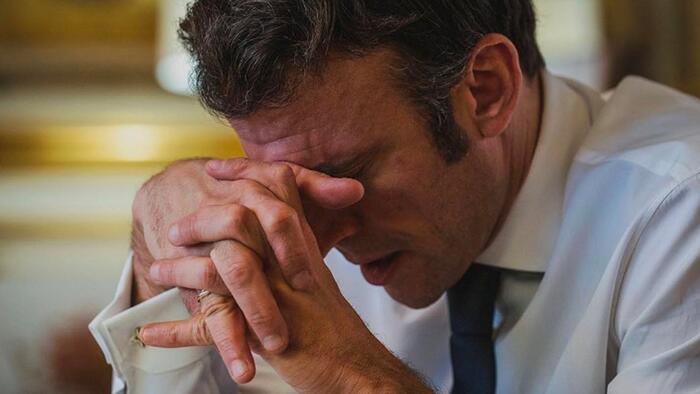


Submitted by Thomas Kolbe
France remains paralyzed even after its latest government reshuffle. Time is running out to consolidate public finances before bond markets turn against Paris.
The office of Prime Minister has become a revolving door. In just three years, President Emmanuel Macron has burned through five governments without visible results. The country is trapped in political shock, a deadlock in parliament that appears unbreakable.
The Hyper-State Emerges
On September 9, Sébastien Lecornu of Macron’s Renaissance party took the poisoned chalice from his failed predecessor François Bayrou. Like those before him, Bayrou was broken by France’s structural inability to reform. The country sustains one of the most bloated welfare systems in the world, with government expenditure at 57% of GDP. This overextended welfare state acts as a sedative for a migration-driven society that has shifted into full socialist-style management of the economy—and now cannot find a way out.
France buys social peace with ever-larger sums of borrowed money. The strategy leaves deep holes in the public accounts and barely hides the fractures of a fragmented society, where class conflict grows more aggressive and Islamist subcultures flourish. With new borrowing at 5.6% of GDP this year and total debt at 114%, France faces the classic Ponzi dilemma: once old debt can no longer be rolled into new issuance, the entire system collapses.
Markets Focus on Assets, Not Just Debt Ratios
Such crises usually begin with a loss of confidence—either from political breakdown or from the realization that a debtor state lacks the real assets to cover obligations. Many commentators point to America’s even larger debt burden, but the comparison is misleading. The U.S. is the world’s largest economy, energy independent, with unmatched technological supremacy. Future productivity gains give Washington leeway to stabilize its debt. Europe, and especially France, cannot make the same claim.
Thus, one of the EU’s central pillars is heading into a showdown with investors. And as always, the European Central Bank will be forced to step in as the last line of defense to stave off systemic collapse.
ECB Fire Brigade: “Whatever It Takes” Redux
The ECB has developed a formidable toolbox: sovereign bond purchases on secondary markets (SMP/OMT), massive media management campaigns, liquidity injections into banks, and interest-rate maneuvers. Officially, such interventions are tied to austerity or reform requirements under EU or IMF supervision. In practice, those conditions are watered down to platitudes. Fiscal consolidation has become a theoretical construct—a ritual statement at summits designed to mask the reality of lost control.
The ECB can also cut policy rates or flood banks with short-term liquidity to prevent credit crunches and contagion. But this creates a deeper trap: each intervention erodes monetary stability and fiscal discipline further. The Eurozone now survives only under permanent monetary anesthesia.
Lecornu Inherits a Poisoned Chalice
Since summer 2024, France has been under EU deficit proceedings, joining six other violators of the Maastricht rules. But the procedure is toothless. No one in Brussels or Paris pretends the old stability pact matters anymore. The EU has become a debt union. Its political class assumes the printing press of the ECB will cover their deficits indefinitely.
Lecornu’s “reform” strategy is the same story: tax hikes instead of structural change. The government plans to reduce the deficit from 5.4% in 2025 to below 3% by 2029. To get there, Paris targets €44–50 billion in “savings”: €30 billion in spending restraint and €20 billion in new levies. Corporate taxes that were scheduled for repeal are extended to 2030. A special tax will hit high earners (€250,000 for singles, €500,000 for couples). Energy consumers will face higher costs on electricity, gas, and air travel. Even multinational corporations will face new surtaxes.
This is “consolidation” in the European sense: more revenue extraction, not genuine reform. The strategy seeks to buy social calm while reassuring bond markets—an impossible balancing act.
Markets Are Already Signaling Trouble
Whether Lecornu can deliver politically is doubtful. Bond markets are already voting. French 10-year yields, negative as recently as 2020, now hover around 3.57%, the highest in a decade. Spreads against German Bunds have blown out to 75–80 basis points from under 30 just a few years ago. Investors see mounting risk in French paper, a reflection of fiscal chaos and political paralysis.
Stripping out inflation (officially ~3%, realistically higher), the Eurozone now faces positive real rates after years of zero or negative policy. That exposes the zombification of its economies. Years of artificial support have left public and private sectors too weak to sustain debt under real market conditions.
Zombie Economy Without a Future
The Eurozone model—centralized control, endless debt, permanent ECB intervention—is reaching its limit. France exemplifies the result: a bloated welfare state, collapsing competitiveness, and a debt burden that can only be rolled until markets say “enough.”
Don’t expect Washington to rescue Europe. Dollar swap lines from the Fed are reserved for key allies such as Japan. Europe is no longer seen as a privileged partner, especially after Brussels’ hostile Digital Services Act and Digital Markets Act. In Washington, Brussels looks more like a second-class petitioner than a systemic ally.
The lesson is simple: ignore real risks long enough, paper over them with monetary morphine, and you guarantee a spectacular blow-up. France looks like the likeliest trigger point—a systemic crisis that will spread like wildfire across the Eurozone.
About the author: Thomas Kolbe, a German graduate economist, has worked for over 25 years as a journalist and media producer for clients from various industries and business associations. As a publicist, he focuses on economic processes and observes geopolitical events from the perspective of the capital markets. His publications follow a philosophy that focuses on the individual and their right to self-determination.
